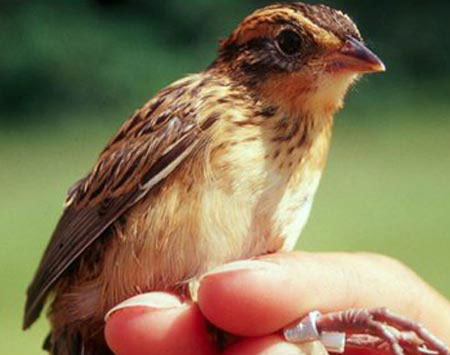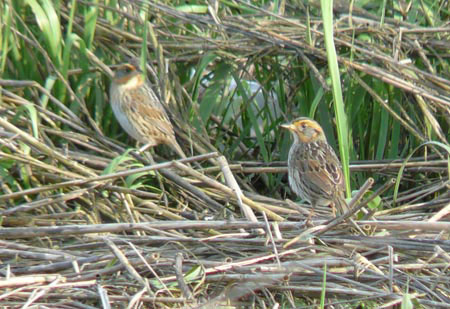The most 'promiscuous' bird on the planet
Scientists claim that finches that live in salty swamps in the US are the most indiscriminate mating behavior in the bird world.

Ammodramus caudacutus Sparrow.Photo: Chris Elphick.
The BBC said that Ammodramus caudacutus finches live in salt marshes along the US coast. Connecticut state. Chris Elphick - a professor at the University of Connecticut, USA - has been studying this bird for many years. He and his colleagues analyzed the finches' DNA and observed their mating behavior.
"We found that every nest is a product of two or more male males. Two young birds with different fathers are extremely popular , " Elphick said.
Elphick's group found at least 95% of females mate with more than one male in a litter. On average, each nest is produced by 2.5 males. The groups in which each young bird has a different father account for 1/3.
"The probability of two young birds having the same father is only about 23% , " Elphick said.

Males and females are not paired for nesting.Photo: 1000birds.com
Some acts of Ammodramus caudacutus finches are quite strange compared to most songbirds. For example, males and females do not pair to make a nest. The male is also not involved in the parenting process. They nest between salt marshes so it is easy to be attacked by big waves. Meanwhile, huge waves occur every 4 weeks - just enough time for a female to raise a large chimp.
Professor Elphick said that the indiscriminate mating behavior of female finches is a way to cope with a risky living environment.
"If the sparrows lose their children because of the big waves, they will have to re-create the nest immediately to produce new eggs," BBC quoted Elphick.
That means the female does not have much time to look for the best males. So the probability for them to mate with "poor quality" males has increased. In order for the children to enjoy the best genomes, the female is forced to mate with many males.
"The females also have a risk distribution strategy when choosing a father for their children , " Elphick commented.
- The most lonely bird on the planet is dead
- Big bird - High-speed bird of prey
- 5 interesting things about eggs
- Marvel at the strange bird's nest in the world
- This is a bird known as the 'female canopy' of the animal world
- Detection of the second bird flu outbreak in the Netherlands
- How to use bird's nest is healthy
- New bird flu detected in the Netherlands
- Amazingly discovered about the 100 million-year-old bird in amber
- Concerned about the return of bird flu, Sweden destroyed 200,000 chickens
- 'Humans must find another planet'
- How to recognize real bird's nest water
 Animal 'suffering' after hibernation
Animal 'suffering' after hibernation Why do goats climb well?
Why do goats climb well? Scientists were surprised to see chimpanzees eating turtles
Scientists were surprised to see chimpanzees eating turtles Giant catfish died deadly due to drought in Thailand
Giant catfish died deadly due to drought in Thailand